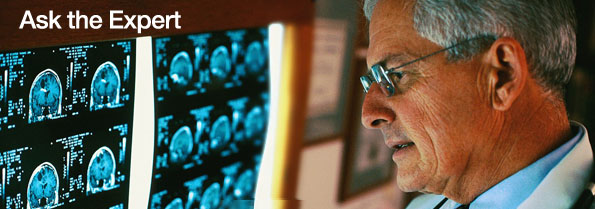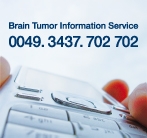Advice for patients
10 helpful hints for patients
The term brain tumour summarizes approximately 130 different kinds of tumours in the central nervous system, benign as well as malignant ones. In the fight against these tumours modern surgery methods, chemo- and radiotherapy and immune- and antibody therapy as well are being applied. Nevertheless there is still no cure for several brain tumour types.
That is why it is even more important to get comprehensive information in order to be able to use all therapeutic options and available offers of help. To support you during that situation, we have collected some tips to give you a first orientation.
1. Inform yourself about the subject brain tumour!
The most important foundation while dealing with the disease is to collect comprehensive and current information. This helps you to optimize the therapy, to cope better with your illness and to make decisions. Knowing the different therapeutic options can reduce psychic stress caused by the disease and increase survival chances.
You can find relevant information on the websites of the neurosurgical clinics, at www.hirntumorhilfe.de or in our free magazine “Brainstorm”. “Brainstorm” can be ordered from the German Brain Cancer Association, either online or by telephone: 0049 341.590 93 96.
2. Involve relatives and friends!
Talk with your relatives and friends about the disease, your feelings and fears. The backing of closely related people can be a huge emotional support. Inform your social environment about first aid measures, for example if an epileptic seizure may occur.
Ask a relative or friend to accompany you to your medical consultations. Encourage your companions to participate actively and to ask questions, so that they can stand supportive by your side. As many emotions may come along with a medical consultation, the mental support and a second pair of ears can be a great help.
3. Look for an expert!
Brain tumours are among the rare diseases and require an individual treatment by specialists. Ask your treating physician or the colleagues of the brain tumour information service (0049 34347.702 702) about specialist clinics and neuro-oncology experts who can treat you interdisciplinary.
4. Get a second opinion in case of ambiguities!
If there are ambiguities you should obtain a second opinion from another physician. This can either confirm the diagnosis respectively the proposed treatment or reveal new therapeutic options. Ask your doctor where to get a second opinion or contact our brain tumour information service.
5. Prepare yourself for medical consultations!
Prepare yourself for medical consultations by dealing with your disease. Note questions that you want to ask the doctor. In this way you avoid forgetting essential issues. It can also be recommended to take brief notes during the medical consultation to remember the most important aspects. Address ambiguities directly and ask for explanations of unknown medical terms because the medical specialist is your most important contact person.
6. Get comprehensive explanations!
Ask your doctor about the planned therapy and why this very therapy is being recommended. Try to get information about additional therapeutic options and clinical trials. The colleagues of the German Brain Tumour Association will be glad to assist you here.
7. Start an own medical file!
Request copies of all examination results, physician’s letters and MRI-images. These are due to you by law and have to be handed over when inquired. Create a file where you can keep all your medical documents.
8. Get help in case of problems concerning social law!
The hospitals outreach service should be your first point of contact in case of any problems concerning social law like disabled persons pass, sickness benefit, attendance allowance or rehabilitation. There you can find advice and quite often help with your application. The colleagues of the German Brain Tumour Association are glad to inform you about further contact points.
9. Use psychooncological advice!
Right from the start you can use professional support for your mental concerns. Psychooncologists who appear in many hospitals or external psychosocial or cancer counselling services are contact points. You can also contact the helpline of the German Brain Tumour Association on Tuesdays from 10 a.m. till 3 p.m. under 0049 3437.999 68 67. The helpline offers psychosocial support for patients and relatives. In addition to that we can assist you in finding local patient groups and counselling services.
10. Benefit from help and support opportunities!
While looking for current information and the right contacts you are not on your own. Besides the brain tumour information service by telephone the German Brain Tumour Association offers a broad variety of information in the internet. You can ask questions anonymously in our online forum at any time with quick answers from other patients and experts. Get additional information through our free patient magazine “Brainstorm” and on our Brain Tumour Information Days throughout Germany. Use these possibilities and contact us- we are glad to assist you!
Brain Tumour Information Service
0049 3437.702 702 Monday to Fritday 10 a.m. till 4 p.m.
Patient Helpline
0049 3437.999 68 67 Tuesday 10 a.m. till 3 p.m.
Brain Tumour Forum
Donation Account
Sparkasse Muldental
IBAN DE83 8605 0200 1010 0369 00
BIC SOLADES1GRM
Volks- und Raiffeisenbank
IBAN DE07 8609 5484 5000 1535 00
BIC GENODEF1GRV
© 22.04.2014, Deutsche Hirntumorhilfe e.V. | www.hirntumorhilfe.de







